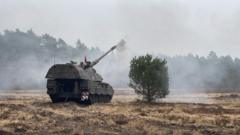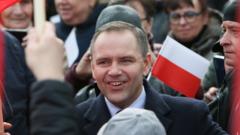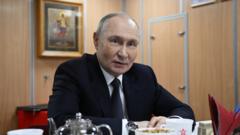European leaders met to bolster support for Ukraine, but U.S. strategies under Trump create a rift, showcasing divergent goals.
Trump's Foreign Policy: Europe Faces Uncertainty Amid Ukraine War

Trump's Foreign Policy: Europe Faces Uncertainty Amid Ukraine War
The discord between the U.S. and Europe deepens as diplomatic efforts stall around Ukraine.
In Paris, European leaders gathered recently to deliberate on a renewed commitment to support Ukraine amidst the continuing conflict. Their discussions, however, yielded little in terms of clear strategy or actionable plans, highlighting the growing friction between European nations and the Trump administration.
During the summit, French President Emmanuel Macron emphasized the need for a free and stable Ukraine, capable of resisting any renewed Russian threats. He declared, “We must place Ukraine in the strongest position to negotiate a solid and durable peace.” This statement reflects an unwavering commitment among European leaders to support Ukraine, contrasting sharply with the U.S. approach.
The Trump administration's agenda seems focused on swiftly concluding the war, prioritizing American economic interests over the diplomatic cohesiveness that European allies seek. Reports indicate that Trump's approach includes reviving relations with Russia and obtaining significant reparations from Ukraine, a strategy that many European leaders perceive as neglectful to their joint objectives.
As discussions unfolded in Paris, it became increasingly clear that the alliance between Europe and the U.S. is at risk, becoming more akin to "ships passing in the night." President Trump’s outlook may inadvertently indicate a reward for President Putin's actions, a prospect that European nations are keen to avoid.
The divide highlights the precarious balance of power and decision-making that characterizes the current geopolitical landscape, underscoring the urgency for greater collaboration to navigate these uncertain waters.
During the summit, French President Emmanuel Macron emphasized the need for a free and stable Ukraine, capable of resisting any renewed Russian threats. He declared, “We must place Ukraine in the strongest position to negotiate a solid and durable peace.” This statement reflects an unwavering commitment among European leaders to support Ukraine, contrasting sharply with the U.S. approach.
The Trump administration's agenda seems focused on swiftly concluding the war, prioritizing American economic interests over the diplomatic cohesiveness that European allies seek. Reports indicate that Trump's approach includes reviving relations with Russia and obtaining significant reparations from Ukraine, a strategy that many European leaders perceive as neglectful to their joint objectives.
As discussions unfolded in Paris, it became increasingly clear that the alliance between Europe and the U.S. is at risk, becoming more akin to "ships passing in the night." President Trump’s outlook may inadvertently indicate a reward for President Putin's actions, a prospect that European nations are keen to avoid.
The divide highlights the precarious balance of power and decision-making that characterizes the current geopolitical landscape, underscoring the urgency for greater collaboration to navigate these uncertain waters.




















